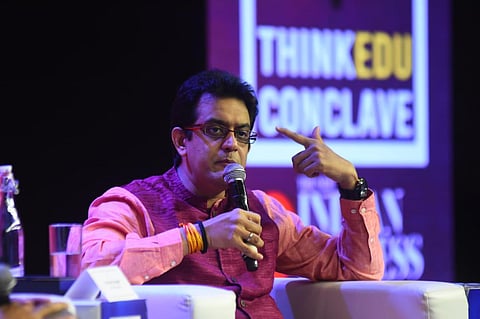

CHENNAI: Apart from the political-economic aspects of colonisation, there is also the dimension of cultural subjugation that makes colonies subliminally believe that their language, epistemology, history and traditional education and belief system are inferior to the colonisers, said historian and author Vikram Sampath on the second day of the tenth ThinkEdu Conclave on Wednesday, March 9.
"How long this will last depends on political and historical factors but reclaiming our identity and decolonisation of the Indian mind is a work in progress. Decoloniality is not a discourse against someone but of looking within your own systems and getting back to your roots," he said, speaking on the topic 'An Epic Idea: Decolonising the Indian Mind' along with Rajeev Gowda, spokesperson of the Indian National Congress.
Colonisers make you feel as if they have a natural right to rule over you and history is used by colonisers as an important tool — historically, only a 'laundry list' of lost battles are shown, he added. "Even some sections of educated Indians are subliminally made to believe India is an artificial product stitched together by the British. Even today, without any malice or political prejudices, a section of Indians believe that it was the British who gave us a sense of a nation and before them, we were just fighting with each other," he said.
Speaking on the topic, Rajeev Gowda said, "I want to point out that colonisation is also about feelings of inferiority and limitations in their minds that come in the way of their aspirations." He added that in order to decolonise, we also have to offer an alternative view of how the country should look like. "We have to focus on the future — how do we create or recapture the glory of modern India which is on par with the best of the world. We have to focus on how far we've come from the poverty that we found ourselves in 1947," Gowda said. Inclusion and treating everyone equally was key to the process, he said, adding that the Congress had been instrumental in the introduction of several reforms towards this, including bringing in the Panchayati Raj.
ThinkEdu 2022 is the grand tenth edition of what has consistently been India's biggest education conclave for a decade now. March 8 and 9 will see some stalwarts of India's academic, economic and political ecosystems bring ideas, ideologies and reflections on the past, present and future of India's education system. The sessions will be viewed by a live audience, in addition to the 2,750 registered users on the conclave's digital space. Over the last nine years, the conclave has seen some true stalwart thinkers such as former presidents Dr APJ Abdul Kalam and Dr Pranab Mukherjee, MPs Jairam Ramesh, Smriti Irani, former CM of Jammu and Kashmir Farooq Abdullah, NITI Aayog's CEO Amitabh Kant and spiritual guide Sadhguru.